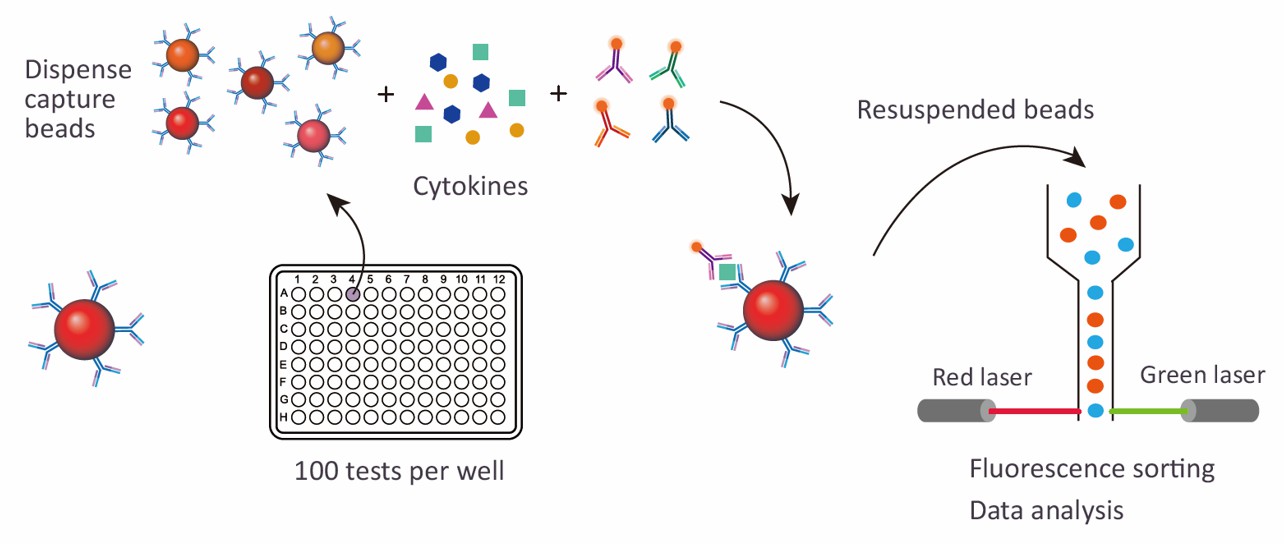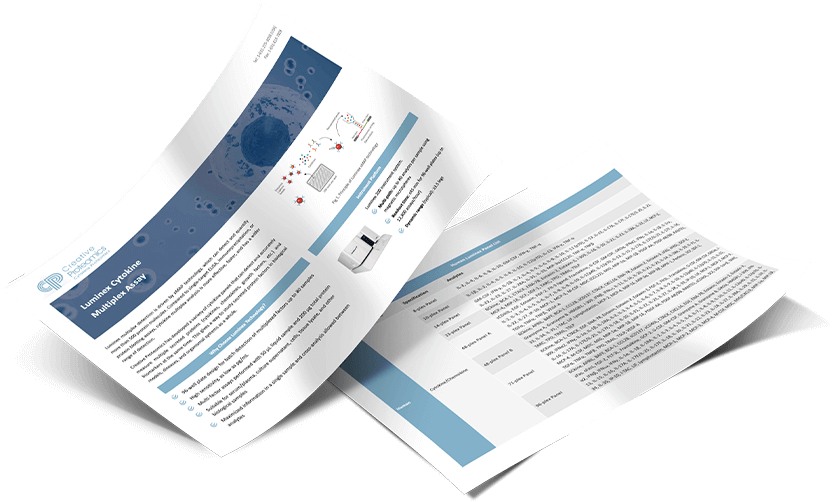- Services Overview
- Analytes Details
- FAQ
CD8+T Cell in Mouse
CD8+ T cells, or cytotoxic T lymphocytes (CTLs), are crucial components of the adaptive immune system, responsible for recognizing and eliminating infected or malignant cells. In mice, CD8+ T cells play a vital role in immune responses to pathogens, tumors, and autoimmunity, making them a central focus in immunological research.
Mouse CD8+ T cells are often used as models for human immune responses due to the genetic similarities between mice and humans. However, there are significant differences in the immune systems of various species that can impact the analysis of CD8+ T cell functions. For example, while mouse CD8+ T cells are commonly assessed using flow cytometry, cytokine assays, and gene expression analysis, certain markers or immune responses observed in mice may not directly translate to humans or other species due to species-specific differences in immune regulation.
In mice, CD8+ T cells are primarily assessed in the context of tumors, infections, and vaccines. Studies typically focus on their activation, proliferation, cytokine production, and cytotoxic potential. However, when comparing across species, such as non-human primates or humans, there are variances in the types of cytokines produced and the specific markers used to distinguish activated or memory CD8+ T cells. Understanding these species-specific differences is critical for translating findings from mouse models to human clinical applications.
Mouse CD8+T Cell Panel at Creative Proteomics
At Creative Proteomics, our Mouse CD8+ T Cell Panel utilizes advanced Luminex xMAP technology to deliver a comprehensive analysis of CD8+ T cell function and phenotype. This multiplex assay enables the simultaneous detection of multiple cytokines, chemokines, and immune markers from small sample volumes, providing detailed insights into CD8+ T cell activation, differentiation, and response. Our service is designed to support a wide range of immunological research, including cancer immunotherapy, vaccine development, and autoimmune disease studies, offering high sensitivity, reproducibility, and customizable options tailored to specific research needs.
Detection Method
Magnetic bead-based Luminex multiplex assay
Species
Mouse
Analytes Detected
| Species | Specification | Protein Targets | Application | Price |
|---|---|---|---|---|
| Mouse | Mouse CD8+T Cell 12-plex Panel | CCL3/MIP-1 alpha, CCL4/MIP-1 beta, Fas Ligand/TNFSF6, GM-CSF, Granzyme B, IFN-gamma, IL-2, IL-4, IL-5, IL-10, IL-13, TNF-alpha | Designed for studying CD8+ T cell activation, cytokine production, and immune responses in cancer, infections, and immune modulation. | +Inquiry |
Sensitivity (Detection Limits)
- CCL3/MIP-1α: 5–10 pg/mL
- CCL4/MIP-1β: 4–8 pg/mL
- Fas Ligand/TNFSF6: 3–6 pg/mL
- GM-CSF: 6–12 pg/mL
- Granzyme B: 5–8 pg/mL
- IFN-γ: 5–10 pg/mL
- IL-2: 8–15 pg/mL
- IL-4: 5–12 pg/mL
- IL-5: 6–10 pg/mL
- IL-10: 8–15 pg/mL
- IL-13: 6–12 pg/mL
- TNF-α: 10–20 pg/mL
Advantages of Mouse CD8+T Cell Luminex Assay
- High Multiplexing Capability: The Luminex xMAP technology allows for the simultaneous measurement of multiple biomarkers in a single sample. This capability enables the detection of cytokines, chemokines, and immune markers associated with CD8+ T cell activation, differentiation, and cytotoxic activity. By analyzing multiple targets at once, researchers can obtain a comprehensive profile of immune responses without the need for multiple assays.
- High Sensitivity and Specificity: The Luminex platform provides ultra-sensitive detection of even low-abundance analytes, making it ideal for assessing the subtle changes in cytokine production and immune marker expression that often occur in CD8+ T cells. The technology ensures precise and reliable quantification, even at picogram-level concentrations, providing high-quality results for both baseline and experimental conditions.
- Efficient Use of Sample Material: The assay requires relatively small sample volumes, making it ideal for situations where sample availability is limited, such as with rare or precious biological samples. This feature enhances the feasibility of conducting multiple tests with a limited amount of material, particularly when working with animal models or difficult-to-obtain clinical samples.
- Customizable Panels: While Creative Proteomics offers a standardized mouse CD8+ T cell panel, the assay can be customized to include specific markers relevant to the research needs of individual studies. This flexibility allows researchers to tailor the panel to their specific immunological focus, whether it's studying immune responses in cancer, infection, or autoimmune diseases.
- Reliable and Reproducible Results: Luminex technology is renowned for its reproducibility, ensuring that experiments can be repeated with consistent outcomes. This reliability is critical for generating data that can be used for validation studies or in publications, providing confidence in the results.

Sample Requirements for Mouse CD8+T Cell Luminex Panel
| Sample Type | Sample Volume | Storage Conditions | Additional Notes |
|---|---|---|---|
| Peripheral Blood (PB) | 50 µL - 100 µL | Fresh or -80°C (if not used immediately) | Blood should be collected using appropriate anticoagulants. |
| Spleen Tissue | 50 mg - 100 mg | Fresh or -80°C | Tissues should be properly preserved and shipped on dry ice. |
| Lymph Node Tissue | 50 mg - 100 mg | Fresh or -80°C | Ensure tissue integrity during shipping. |
| Bone Marrow | 50 mg - 100 mg | Fresh or -80°C | Samples should be shipped promptly for optimal results. |
| Peritoneal Lavage Fluid | 200 µL - 500 µL | Fresh or -80°C | Collect lavage fluid in sterile tubes; store immediately at -80°C. |
Application of Mouse CD8+T Cell Panel
- Cancer Immunotherapy Research: CD8+ T cells are critical effectors in the immune response against tumors. Our panel enables researchers to evaluate the activation and function of CD8+ T cells in response to immunotherapies such as checkpoint inhibitors, CAR-T cell therapy, and vaccines. It helps in assessing cytokine production, cytotoxicity, and overall immune response.
- Vaccine Development: The panel can be used to evaluate the immune response to experimental vaccines. By measuring the activation and differentiation of CD8+ T cells, researchers can gauge vaccine efficacy and optimize vaccine formulations for stronger immune protection.
- Autoimmunity and Inflammation Studies: In autoimmune diseases, CD8+ T cells can play a pivotal role in the pathogenesis of inflammatory diseases. Our panel aids in studying the immune activation pathways that drive diseases like rheumatoid arthritis, multiple sclerosis, and type 1 diabetes.
- Infection and Pathogen Research: CD8+ T cells are key players in the immune response to viral, bacterial, and parasitic infections. This panel allows for the assessment of CD8+ T cell responses to infections, helping researchers understand the immune mechanisms involved and identify potential therapeutic targets.
- Immunomodulation Studies: Researchers investigating immune modulators, such as cytokines, chemokines, and other immune-regulatory molecules, can benefit from the mouse CD8+ T cell panel. It provides an in-depth analysis of how these molecules influence CD8+ T cell function and can aid in developing new immunotherapeutic strategies.
In addition to preconfigured panels, we also offer customized analysis services. You can customize your own panel through our customization tool, or directly email us the targets you are interested in. A professional will contact you to discuss the feasibility of customization. We look forward to working with you!
| Protein Target | Description |
|---|---|
| CCL3/MIP-1α | A chemokine involved in the recruitment of immune cells to sites of inflammation and infection. |
| CCL4/MIP-1β | A chemokine that regulates immune cell migration, contributing to immune responses and inflammation. |
| Fas Ligand/TNFSF6 | A molecule that binds to Fas receptor, inducing apoptosis and regulating immune cell activation. |
| GM-CSF | A cytokine that stimulates the production of granulocytes and macrophages, critical for immune response. |
| Granzyme B | A cytotoxic enzyme secreted by CD8+ T cells and NK cells that induces apoptosis in target cells. |
| IFN-γ | A cytokine essential for activating macrophages and promoting immune responses, particularly against infections and tumors. |
| IL-2 | A cytokine that promotes the growth, proliferation, and activation of T cells, playing a key role in immune responses. |
| IL-4 | A cytokine involved in promoting Th2 responses, influencing B cell differentiation, and regulating immune responses. |
| IL-5 | A cytokine that plays a role in the activation and differentiation of eosinophils, important in allergic responses. |
| IL-10 | An anti-inflammatory cytokine that regulates immune responses, limiting excessive inflammation and tissue damage. |
| IL-13 | A cytokine that plays a key role in regulating immune responses, particularly in allergic reactions and asthma. |
| TNF-α | A pro-inflammatory cytokine that regulates immune responses, inflammation, and cell apoptosis. |
Are the results from the Mouse CD8+ T Cell Panel reproducible?
Yes, the Luminex xMAP technology is known for its high reproducibility. The multiplex nature of the assay ensures consistent results across multiple experimental runs. This makes the Mouse CD8+ T Cell Panel ideal for validation studies and publications, providing reliable data that can be used for further research or therapeutic development.
Can I use the Mouse CD8+ T Cell Panel for longitudinal studies?
Yes, the panel can be used to monitor CD8+ T cell responses over time in longitudinal studies. Whether you are tracking changes in immune responses to therapy, vaccination, or disease progression, our assay is well-suited to provide consistent and comparable data across multiple time points.
How accurate are the results from the mouse CD8+ T cell panel?
Our Mouse CD8+ T Cell Panel, based on Luminex xMAP technology, is known for its high sensitivity, specificity, and reproducibility. The assay is designed to deliver accurate and reliable results, even for low-abundance analytes like cytokines. The ability to measure multiple biomarkers simultaneously ensures a comprehensive profile of immune responses. Furthermore, the platform is rigorously validated to ensure consistent and reproducible data across experiments.

